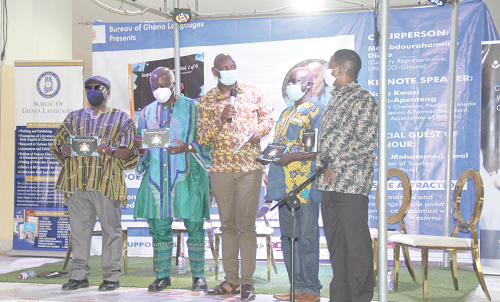
Prioritise local dialects over foreign languages - Gyan-Apenteng urges Ghanaians
A media consultant, Nana Kwasi Gyan-Apenteng, has urged people to prioritise their local dialects over foreign languages to enable the country to sustain its cultural heritage.
He said in recent times learning and speaking of English as an official language had not only become a privilege, but had also created a hierarchy of legitimacy of which the ability to speak English fluently was at the top of the food chain.
Advertisement
In a multi-ethnic society such as Ghana, the consultant said, maintaining dialects of ethnic and cultural groups was critical for the preservation of people’s identity.
Nana Gyan-Apenteng, who is also a former Chairman of the National Media Commission (NMC), was speaking at the launch of a book by the Bureau of Ghana Languages (BGL) in Accra last Sunday.
Titled “Inspirational Poems,” the book is written by Prof. Lade Wosornu and translated into 15 local dialects by the BGL.
Self-interest
According to Nana Gyan-Apenteng, “human beings act in accordance with their perceived self-interest and parents know that in these circumstances their children will have a better life if they speak English. This is why today, even parents who cannot speak English speak it to their toddlers.”
“This behaviour, which has taken deep roots in our country, goes against sensible and pragmatic policy advice provided by our own government and experts who say that children learn other languages even better if they start life with their own mother tongue,” he said.
In this era of globalisation and contemporary technological challenges, the consultant said it was important for people to recognise that their culture was the basis of their identity and the most important factor in the nation’s human and material development.
He, therefore, said history, cultural values and institutions must continue to exercise deep influence on the nation’s destiny, including governance and people’s way of life.
Suggestion
Nana Gyan-Apenteng further suggested that the Ghana Cultural Policy, which was the mother document that consisted of major cultures in the country, needed to be revised and brought into line with the current digital space.
“We know that many languages have died, some in our own country, which is sad because when a language becomes extinct or is spoken by only a few old people, the culture of that language loses its dynamism and eventually dies as well.
“This is why I urge the Ministry of Tourism, Arts and Culture to look at the idea of revising the culture policy document and take another look at the architecture of the administration, including the funding of culture in this country,” Nana Gyan-Apenteng added.
Commendation
For his part, Prof. Wosornu commended the BGL for acknowledging his work and coming up with such a book.
“When the decisions were being taken, I was not in those corridors of power but after the deliberation, my work was considered. I thank everyone who has supported me this far and I thank all the people who came together to make this happen,” he said.



